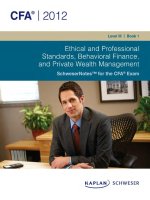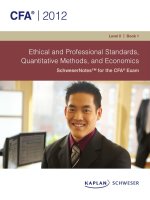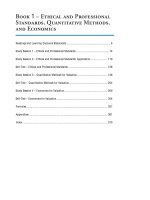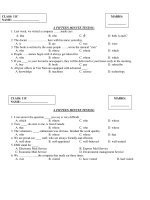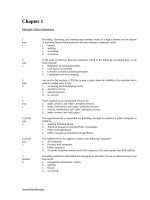Q a schweser self test 01 ethical and professional standards answers
Bạn đang xem bản rút gọn của tài liệu. Xem và tải ngay bản đầy đủ của tài liệu tại đây (200.54 KB, 11 trang )
Question #1 of 36
C) none of the Standards.
Explanation
Cutty's use of someone with whom he does personal business as a source could be perceived
by some as a conflict of interest. However, there seems to be no ill intent, and Cutty corroborated
Catcher's information from an additional source (the patent search). The research reports
Standard requires that the analyst use reasonable judgment and distinguish between fact and
opinion-Cutty did that. Cutty's broad-based research also satisfies the requirements of the
reasonable basis Standard.
Question #2 of 36
A) Neither Cutty, Catcher, nor Simpson violated the Standard.
Explanation
Cutty and Catcher's real estate negotiations reflect Paris real estate market conditions. Catcher
works in public relations and only discusses a loan that has been reported in the press. There is
no indication of revealing material nonpublic information or material conflicts of interest. This
makes no violation the best answer choice.
Question #3 of 36
C) "After a few phone calls and an analysis of the relevant information from our internal
database, I concluded that Simpson's new technology was more than just a rumor."
Explanation
While Cutty clearly states that his opinion is based on his own conclusions rather than verifiable
facts, he violates Standard V(B) by not providing details about the evaluation process, which was
quite complicated. Therefore, choice C is not an adequate description of the process, and it is a
violation of the Standard. Cutty's use of "I believe" suggests the statement about sales in choice
B is his opinion. Historical market-share data is a fact, not an opinion, and can be stated as such
as in choice A. Therefore, choices A and B are not violations.
Question #4 of 36
B) trading instructions violated Standard III(C) Suitability.
Explanation
Because Simpson is a risky stock, it is probably not suitable for all clients, and a blanket
purchase order violates Standard III(C) Suitability. Wabb's instructions for the fulfillment
department meet the requirements of Standard III(B) Fair Dealing, as the Standard does not
require that everyone be notified at the same time, only that the dissemination of information is
handled fairly. In this case, everyone with e-mail will get the information at the same time, and
those without e-mail will get it later, but at the same time as their low-tech peers. Wabb acted
correctly as a supervisor by verifying Cutty's facts and procedures.
Question #5 of 36
B) Using statements from the Standard & Poor's report on Simpson without verifying them.
Explanation
Members are in compliance with Standard V(A) Diligence and Reasonable Basis if they depend
on the research of others they know to be competent and diligent. S&P qualifies as such a
source. A rival's report about a competitor with similar technology could have a material effect on
Cutty's financial model for Simpson and must be considered. Cutty should acknowledge the
appropriate source of his information, so his clients can assess for themselves the credibility of
the source and the veracity of the information.
Question #6 of 36
A) Standard VII(B) Reference to CFA Institute, the CFA Designation, and the CFA Program
because of her criticism of Cutty's credentials.
Explanation
Slusher's claim that her credentials are superior to Cutty's because she earned her charter more
recently is a violation of Standard VII(B) Reference to CFA Institute, the CFA Designation, and
the CFA Program. Slusher did not plagiarize Cutty's work because she cited him as the author.
Just because Slusher disagrees with and criticizes Cutty's well-researched opinion does not
mean she has violated the independence and objectivity standard.
Question #7 of 36
A) Only one policy complies with the Standards.
Explanation
According to Standard III(C) Suitability, members and candidates must consider investment
experience, objectives (risk and return), and constraints before investing funds on the client's
behalf or recommending investments to the client. The firm has complied with the information
content. The IPS must be updated at least annually or after significant changes in client
circumstances, according to the guidance statement accompanying Standard III(C). Thus, the
firm has not complied with Standard III(C) in this regard.
Question #8 of 36
C) must adhere to the existing portfolio strategy until she meets with Singh to develop a new
portfolio strategy based upon updated financial information but may place trades which are
consistent with the existing strategy.
Explanation
According to Standard III(C) Suitability, Patel must observe the written investment objectives now
in effect as determined in cooperation with the client and may trade only on that basis. Because
the anticipated change in Singh's financial condition was subject to an event of indeterminable
timing, she should continue to honor the existing written investment objectives until a change (1)
is warranted by an actual increase in the client's total financial assets and (2) has been agreed
upon with her client.
Question #9 of 36
B) No, because Patel and Singh must meet and revise the IPS and portfolio strategy before
reallocating.
Explanation
According to Standard III(C) Suitability, investment recommendations and actions must be
consistent with a client's written objectives and constraints (usually in the form of an IPS).
Because Singh's written IPS would not allow the large allocation to technology stocks prior to
receiving the inheritance, the IPS must be updated by Singh and Patel prior to taking any actions
that deviate from the original IPS. Patel will violate Standard III(C) by reallocating the portfolio
before meeting with Singh.
Question #10 of 36
A) Patel violated the Standards for both Singh's portfolio and the other clients' portfolios.
Explanation
According to Standard III(C) Suitability, Patel must analyze the appropriateness and suitability of
NetWin stock on a case-by-case basis before buying it. This will necessarily consider the basic
characteristics of the security and how these will affect overall portfolio characteristics relative to
the existing investment strategy for each portfolio. Patel has not analyzed the effect that the
stock will have on any of the individual portfolios in question and has thus violated the Standard.
Patel cannot look at aggregate measures to determine the appropriate weight that the security
should represent in the individual portfolios because the portfolios are being managed
individually, not in aggregate.
Question #11 of 36
C) fact that a promotional announcement was made violates the restrictions on misrepresenting
the meaning of the CFA designation.
Explanation
An announcement that a member of a firm has received the right to use the CFA® designation is
not a violation of the Code or Standards. However, Standard VII(B) requires that any reference to
the Charter must not misrepresent or exaggerate the meaning or implications of the CFA
designation. A Charterholder cannot claim that holding a Charter leads to superior performance
results. The letters "CFA" can only be used as an adjective (never a noun, as in "he is a CFA").
As long as it is true, stating that she passed her exams on her first attempts is not a violation.
Question #12 of 36
A) No.
Explanation
Because Singh directed Patel to use TradeRight, this should be considered client-directed
brokerage. While Patel should inform Singh of the implications of that choice, Patel has no option
but to follow the client's direction according to Standard III(A) Loyalty, Prudence, and Care. Singh
was fully aware of the fees charged by TradeRight relative to other brokerage firms and elected
to use TradeRight anyway. Answer choice B is generally correct in the absence of client
direction.
Question #13 of 36
C) determine what constitutes adequate compliance procedures under the CFA Institute Code
and Standards and then implement such procedures immediately.
Explanation
In order to best conform to the CFA Institute Code and Standards, Lee should first define what
constitutes adequate standards. According to Standard IV(C) Responsibilities of Supervisors,
"'adequate' procedures are those designed to meet industry standards, regulatory requirements,
the requirements of the Code and Standards, and the circumstances of the firm." Once this has
been done, he should implement the procedures immediately.
Question #14 of 36
A) Yes.
Explanation
In order to be in compliance with Standard IV(B), Jin must disclose all additional compensation
arrangements, in writing, to her employer. It does not matter whether Rearguard actually pays
her a commission on the funds or whether the firm previously had such a policy. In addition, the
relationship with Rearguard creates a potential conflict of interest between Jin and her clients
because she may be tempted to increase her income by recommending Rearguard Funds that
are inappropriate for her clients' needs. Standard VI(A) Disclosure of Conflicts requires
disclosure of such conflicts to clients and prospects. There is no indication that Jin has made
such a disclosure.
Question #15 of 36
B) Both Lee and Yu violated the CFA Institute Standards.
Explanation
Yu is in violation of Standard II(A) Material Nonpublic Information, as she has used material
nonpublic information in her investment recommendations. She is forbidden to act upon such
information. Lee, the firm's compliance officer, has violated Standard IV(C) Responsibilities of
Supervisors in the discharge of his responsibility as a supervisor. Given the abrupt change in the
recommendation, Lee should have attempted to determine if there was a reasonable basis for
the dramatic shift in opinion.
Question #16 of 36
A) No.
Explanation
According to Standard III(B) Fair Dealing, members and candidates must ensure that all clients
are treated equitably with regard to investment recommendations and investment actions.
Because MH has clients that subscribe to their research service but do not pay for portfolio
management services and the firm has clients that pay for discretionary portfolio management,
investment recommendations must be communicated to research subscribers and the firm's
portfolio managers simultaneously in order to ensure that all clients have equal opportunity to
trade on the firm's research without being disadvantaged because of the type of service the client
receives.
Question #17 of 36
C) Yes, regarding only one of the lists.
Explanation
According to Standard IV(A) Loyalty, Larson must not solicit current or prospective Affinity clients
prior to his leaving. Larson is allowed to solicit prospects that have been rejected by Affinity as
long as he does so on his own time, does not use Affinity's client lists, and his actions do not
impair his performance at work. His solicitation of prospects who are still viable for Affinity is a
clear violation of duty to his employer under Standard IV(A).
Question #18 of 36
B) No. Authority to enforce the compliance program should rest with the compliance officer.
Explanation
According to Standard IV(C) Responsibilities of Supervisors, the responsibility to implement
procedures and the authority to enforce the procedures should both reside with the compliance
officer (in this case Lee, rather than Jin, who is an investment officer).
Question #19 of 36
C) Yes, regarding either the meeting or the photocopying, but not both.
Explanation
In meeting with the officials, Hogue is performing proper due diligence on the Brazilian market to
support his recommendations to clients. This is entirely appropriate. There is no indication that
he is being inappropriately influenced by the policymakers, and the meeting is not a violation of
the Standards. By photocopying the report, however, Hogue has violated Standard I(D)
Misconduct. Under the Standard, he is not to commit any professional act involving dishonesty or
deceit or conduct himself in a way that reflects poorly on his professional reputation, integrity, or
competence. The report was marked confidential and Hogue was instructed to return it after he
had a chance to read it. The intent was not to distribute the report for Hogue's professional
benefit. He has, therefore, deceived the officials by photocopying the report without receiving
permission.
Question #20 of 36
B) Yes, because he attempted to manipulate the market price of a Brazilian security.
Explanation
Hogue clearly exaggerated the American investors' interest in BAI stock in an attempt to get local
market participants to buy the stock in anticipation of increased American investment. By
pumping the stock, the price rose, and Hogue sold the Brazil Fund position and recommended
investors do the same to take advantage of the artificially high prices. Hogue cites poor business
prospects in his sell recommendation, a clear indication of his devious intent in claiming the high
level of interest from American investors. By manipulating market prices in Brazil, Hogue has
violated Standard II(B) Market Manipulation.
Question #21 of 36
A) No.
Explanation
The contract is fully disclosed to potential investors in the marketing collateral. Thus, investors
can evaluate for themselves the true cost of the transactions. Therefore, the intent of the
increased liquidity is not to deceive investors, but rather to increase the market liquidity and ease
of trading for foreign investors. The contract does not violate Standard II(B) Market Manipulation
because it is disclosed. If it were not disclosed, however, it would constitute a violation.
Question #22 of 36
B) Yes, because he has released the two versions of the report at different times.
Explanation
Standard III(B) Fair Dealing requires members and candidates to deal fairly with their clients.
Hogue can offer different levels of service so long as it is disclosed to his clients and all service
levels are available to all clients. Because his "tier one" clients pay higher fees, the depth of
research they receive may be greater than the "tier two" clients without violating the Standard. By
releasing the reports at different times, however, the "tier two" clients are put at a great
disadvantage simply because they subscribe to a lesser level of service. This is a violation of
Standard III(B), which says that members can offer different services to clients, but different
levels of service must not disadvantage clients.
Question #23 of 36
C) Yes, regarding either the time period or calculation method, but not both.
Explanation
According to Standard III(D) Performance Presentation, Hogue must disclose the fact that the
10-year performance history of the fund is comprised of five years of his performance and five
years of his predecessor's performance. By not disclosing this, the presentation is misleading
and violates Standard III(D). It does not matter that the investment styles are similar or that he
believes most investors are only interested in the last five years of data. Performance
presentations need to be fair, accurate, and complete. His method of calculating returns before
fees and taxes on a market-value-weighted basis is acceptable and fully disclosed. Therefore,
the calculation methodology does not constitute a violation of Standard III(D).
Question #24 of 36
A) No.
Explanation
Hogue is allowed to offer different levels of service without violating Standard III(B) Fair Dealing,
as long as the different levels of service are fully disclosed and offered to all clients and
prospects. Hogue has his "tier two" clients sign a waiver indicating they are aware of the different
levels of service offered by the firm. Thus, he has complied with the Standard.
Question #25 of 36
A) No.
Explanation
Gonzales has recreated the model that he developed while working for his previous employer.
He did not take the model or its supporting documentation from his employer. Instead he has
reproduced them from memory and customized the model to fit his current requirements.
Therefore, he has not violated Standard I(C) Misrepresentation by committing plagiarism, nor
Standard IV(A) Loyalty because he recreated the model at StatInvest and did not simply copy the
model and use it for his new employer's gain. By updating the key identifiers to reflect the
industrial sector and by backtesting the model, Gonzales has complied with Standard V(A) by
having a reasonable and adequate basis, supported by appropriate research and investigation,
for his analysis.
Question #26 of 36
C) Either the model description or its historical results were violations of the Standards but not
both.
Explanation
The description provided by Gonzales is an accurate depiction of the process by which the model
selects stocks to recommend for either a purchase or sell. Gonzales does not provide every
detail regarding the individual factors used to screen the stocks or how the algorithm works
because these are proprietary details. In describing the historical results of the model, however,
Gonzales has violated Standard III(D) Performance Presentation and Standard I(C)
Misrepresentation. In his report, Gonzales omitted the fact that the model selected several stocks
with zero or negative returns. By not including this result in the report, Gonzales is not portraying
a fair, accurate, and complete performance record [a violation of Standard III(D)] and, thus,
intentionally misleads his clients with the recommendations [a violation of Standard I(C)]. Clients
are lead to believe that the model only picks top performers and, therefore, the recommendations
in the report imply that they will fall into this category.
Question #27 of 36
C) Yes, because he provided an inherent guarantee of investment performance that cannot
reasonably be expected.
Explanation
Gonzales has provided a guarantee that the investment returns are going to provide a return in
excess of 15%. This is a misrepresentation of the risk inherent in the stocks and is a violation of
Standard I(C) Misrepresentation, which prohibits such misrepresentations.
Question #28 of 36
C) Neither his record retention nor past recommendations are violations of the Standards.
Explanation
Standard V(C) Record Retention requires members and candidates to maintain records
supporting their research and investment recommendations. Gonzales has kept a copy of both
his electronic and hard copy files used to generate his report and has thus complied with the
Standard with regard to his record retention practices. The fact that the records are stored off site
is not relevant as long as they are being appropriately maintained. Gonzales has also not
violated any Standards by compiling research to support an investment recommendation he
made while at another firm. As long as he did not reissue the recommendation without supporting
documentation or take (without permission) the supporting documentation from the previous
employer, he has not violated the Standards.
Question #29 of 36
B) Yes, because the referral arrangement is not properly disclosed to clients and prospects of
Ryers & Ovitz, Inc.
Explanation
Ovitz cannot rely on disclosures made by StatInvest but must disclose the referral arrangement
to clients and prospects herself. It does not matter that a general overhead account is designated
as the source of funds for the research purchased from StatInvest. Ryers & Ovitz, Inc., and
StatInvest have an agreement that provides a form of compensation to both parties and may
pose a cost to the client either directly or indirectly. In order to assess the full cost of either firms'
services, the client must be aware of the referral arrangement. By not actively disclosing the
agreement, Ovitz has violated Standard VI(C) Referral Fees.
Question #30 of 36
B) Yes, because she has improperly exaggerated the meaning of the CFA designation.
Explanation
Standard VII(A) prohibits members and candidates from taking any action that compromises the
integrity or reputation of CFA Institute, the CFA designation, or the CFA exam. Members and
candidates are allowed, however, to disagree with CFA Institute policies and express their lack of
agreement. Therefore, Ovitz did not violate Standard VII(A). Ovitz did violate Standard VII(B),
which prohibits members and candidates from exaggerating the meaning of the CFA designation.
Ovitz has implied that CFA charterholders are better investment managers and more ethical than
other investment professionals, which overstates the implications of being a charterholder.
Question #31 of 36
B) "Keep sufficient records to justify all investment actions in the event that those actions are
challenged in the future."
Explanation
There is no evidence that Jackson misrepresented the characteristics of NewBio. Because she
only purchased it for clients who already invest in biotech stocks, these are clients for whom
biotech presumably fits their objectives and constraints. The issue concerning fact versus opinion
does not appear relevant to the situation. The key issue is that Jackson acted against the advice
of Super Performance's biotech analyst, who is on record as not liking the stock, so she may be
hard pressed to produce records justifying her purchase of NewBio stock.
Question #32 of 36
A) integrity, competence, and diligence.
Explanation
The first component of the Code of Ethics states, "Act with integrity, competence, diligence, and
in an ethical manner..." All of the traits described are good for an analyst to have, but none of the
other combinations can be found explicitly in the Code of Ethics.
Question #33 of 36
B) Diane Takao is a Level III CFA candidate.
Explanation
The CFA and Chartered Financial Analyst designations must always be used as adjectives,
never as nouns or common names. The description of Diane Takao as a Level III CFA candidate
is accurate
Question #34 of 36
C) Both Ford and Anderson violated the Standard.
Explanation
Together, Standard IV(A) Loyalty and Standard IV(B) Additional Compensation Arrangements
require that Ford and Anderson obtain written consent from both their employer (Super
Performance) and the clients for whom they undertake independent practice. Anderson received
written permission from his employer, but not from his clients. Ford received only verbal
permission from her employer, and while she notified her clients in writing, she did not receive
their permission. As such, both Ford and Anderson violated the Standard.
Question #35 of 36
C) Soft dollars.
Explanation
Logic dictates that even though Eastern is volunteering to cover the costs of Wang's trading
error, they will seek to offset this cost in some way. The most likely method for Eastern to recoup
these costs is to reduce the soft dollar compensation to Super Performance. In so doing, Super
Performance is effectively transferring resources that belong to the client (soft dollars) to itself,
and this violates its fiduciary duty to its clients. The other factors listed seem reasonable or are
unlikely to be affected under the situation.
Question #36 of 36
C) no standards.
Explanation
There is no violation. Super Performance manages discretionary accounts, so its clients need not
be told about the stock, and the company can purchase the stock without disenfranchising any
clients. There is no significance to a 48-hour period for trading. Super Performance's purchase of
Williams & Fudd recommendations violates no Standard. As long as the firm believes Williams &
Fudd's research is good and buys the stock on the open market, there is no conflict of interest.

